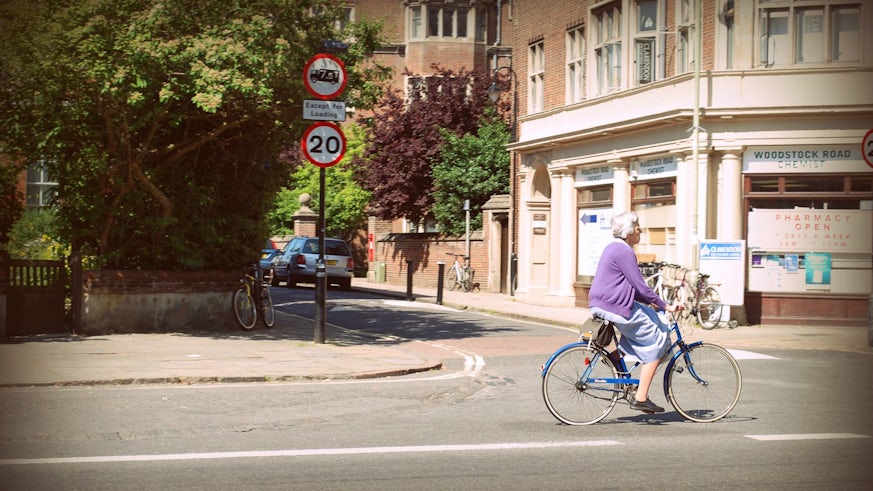UK lags behind Europe in supporting and prolonging cycling among older population
27 September 2016

Cycling could play a significant role in promoting health and wellbeing among the older population but the UK is lagging behind other European countries.
This is one of the findings of a three-year study involving Cardiff University which set out to investigate how older people in the UK experience cycling and how this affects independence, health and wellbeing.
The cycle BOOM study involved 240 participants across Oxford, Bristol, Reading and Cardiff. These were a mix of non-cyclists, current cyclists and also a group of older cyclists who wished to re-engage with cycling after a break and who took part in an eight-week ‘cycling and wellbeing’ trial designed to investigate their experience and measure the impact on their mental and physical health.
Results from the cycling and wellbeing trial showed that cycling has the potential to improve physical and mental health in the older population, however, participants reported that a number of factors including poor and unsupportive infrastructure and fear of injury from other traffic, had a negative impact on their cycling experience.

“Liveable cities are those that accommodate the needs of old and young, and make it easy and enjoyable to choose active modes of travel like walking and cycling. If Cardiff is serious about repositioning itself as Europe's most liveable city it has a long road to travel with regard to cycling."
Dr Justin Spinney of Cardiff University’s School of Geography and Planning said: “Research conducted in Cardiff University's school of Geography and Planning as part of the Cycle Boom project demonstrates that older cyclists are being failed by poor quality, disconnected and illegible cycling environments that do not account for the changing capabilities of the ageing user, ultimately making it harder to continue cycling into later life.”
Dr Tim Jones, Reader at the School of the Built Environment, Oxford Brookes University, who led the study said: “Our research has demonstrated that older people who currently cycle, or who have tried cycling, recognise the positive benefits it can make to their health and wellbeing.
“However, they find infrastructure in the UK generally unsupportive of their needs, and the small minority that do cycle, who we classify as “resilient riders” use various coping strategies to deal with declining capabilities and road danger. This includes timing their rides to avoid peak periods, riding away from motor traffic, adapting cycles, and even riding on the pavement.
“While the issues highlighted are relevant to all cyclists, they are more acutely felt in an ageing cohort as capabilities change and previously easy activities become more difficult. The way our towns and cities are designed, as well as cycle technology, needs to consider the diverging capabilities of different users, if cycling is to be embedded in the lives of an increasingly older population.”
A series of recommendations based on the findings is being presented at final conferences in London and Manchester. This will advise policy makers, and more specifically, planners, engineers and designers, health promoters and the cycle industry, on the part they could play in supporting older cycling as part of a broad age friendly city agenda.
Dr Jones added: “Our study reinforces the need for cities to plough ahead and create a dedicated infrastructure for cycling along major roads, implement slower speed zones and support the growing market of electric bikes. Interventions targeted at promoting older cycling will, not only support healthy ageing, but it will also support younger cycling and help address the pressing issue of low levels of fitness and growing levels of obesity amongst the nation’s younger population.”
Share this story
Our academics and researchers give expert comment through our flagship blog encouraging constructive debate on issues relating to mental health and illness.

